沪教牛津版七上-U1-4知识点、语法
沪教牛津版七上各单元短语及语法要点

沪教牛津版七上各单元短语及语法要点Unit 1 Making friends短语集锦listen toplay basketballplay the guitarbe from=come fromclose togo to schoolgo homebe good at=do well inbe good forbe good tobe good withmake friends withall over /around the worldanswers to these questionslook like句型集萃be good at doing sth.= do well in doing sth. like doing/to do sth.want to do sth.would like to do sth.need to do sth.hope to do sth.decide to do sth.welcome tohow many+复数名词how much+不成数名词what do/does sb. do?What do(es).. .mean?one's dream is to be…语法提要1.特殊疑问句擅长做某事喜欢做某事想要做某事愿意做某事需要做某事但愿做某事决定做某事欢送来到太多...或人是做甚么事情的?2.不定冠词听打篮球弹吉他来自靠近去上学回家擅长擅长应对...的全天下这些题目的谜底be likepay attention toa boy called/named...start with=begin withby bustake the busfar away fromlots of=a lot ofa lot像(外貌或性格)注意乘公交汽车(作状语)乘公交汽车(作谓语)离远很多的,大量的大量,非常放风筝fly kites/fly a kite hear from/receive a letter from 收到或人的来sb.in Englishbest wishesin one's free time用英语最美妙的祝福在某人的空闲时间看起来像(外貌)Unit 2 Daily life短语集锦talk aboutask sb. about sth. look atonce or twice a week daily liferide a bicycle/bike play the piano评论询问某人关于某事每周一两次日常生活骑自行车弹钢琴去上学play computer gameshelp sb. with sth.play with sb.do morning exercisesgo to bedhave classesget up玩电脑游戏匡助或人做某事和或人一同玩做早操去睡觉上课起床havelunch/breakfast/dinner吃午餐/早餐/晚餐go to school in the morninghow longbrush one's teethjunior high schoolon footin the worldplay games from...to...take part inhave a good time /enjoy oneself/have fungo homeafter-school activities after schoolbet ween ...and...in the eveningin the afternoonplay the guitarhow oftenon Saturdaysin the middle of...at the end of...at the beginningplay table tennis句型集莘love doing sth. love to do sth. would like to do sth. enjoy doing sth. send sb. sth.send sth. to sb. teach sb. sth.在上午多长时间刷牙初级中学步行在天下上玩游戏加入过得愉快回家课外活动下学后在晚上鄙人战书弹吉他多久一次在星期六在开头打乒乓球a piece of...a glassof…play volleyballkeep a diarywatch televisionlearn abouthave a break=have a rest eat outthink of...as...wash clothesbe close torun to the playground make great musicat schoolmake a soundeach otherevery daysome of usafter lunchread bookswash one's face aiTive at/get to school cook dinner喜爱做某事喜爱做某事想做某事喜爱做某事寄给某人某物寄给某人某物教某人某物通过做某事记日志看电视进修;相识休息一下进来用饭洗衣服离……近跑向操场弹奏优美的乐曲在校发出声音彼此;彼此每天我们中的一些人午饭后读书洗脸到校做饭by+v.-ingHow+形容词/副词+主语+谓语!What+a/an+形容词+可数名词单数+主语+谓语!Once/twice/...times a week/month/…remember to do sthremember doing sth.语法提要1.普通目前时态What+形容词+可数名词复数/不可数名词+主语+谓语!每周/月/……一次/两次/……次记得去做某事记得做过某事2.频度副词与频度副词短语Unit 3 The Earth短语集锦be covered by被掩盖take a photo/takc photos照相be covered withon Earth=on (the) earthin the skyin the seaprovide sb. with sth.=provide sth. for sb.put...into...make energyof course=certainly=sure fbr exampleone quarterthree quartersat homeat school句型集萃stop doing sthstop to do sth.let sb. do sth.help sb. (to) do sth.ask sb. (not) to do sth. need to do sth.keep+sb./sth.+形容词call sb. sth.here is/are...比较级+and+比较级There is/are+n.+…在地球上在天空中在陆地中为或人供给某物获取能量当然比方四分之一四分之三在家在学校take a look=have a look find outdifferent types/kinds of in the end=at last=finally get cooler看一眼弄清;查明最后变凉throw away抛弃throw. .. into…on the landunder the water在陆地上在水下在海滩上on the beachesa world map =a map of the一幅天下舆图worldtake... to...catch a lot of fish停止做某事停下来去做某事让某人做某事帮助某人做某事请求/要求某人(不)做某事需要做某事有某人或某物There be句型(主谓一致,就近原则)捕很多鱼What's the weather like...? =How is the weather...?It+be+描述词+for sb. to do sth.语法提要1.可数名词与不可数名词的数Unit 4 Seasons短语集锦in spring(in +季候)make snowmen(a snowman)在春天堆雪人在一月in Januaryget married二be married结婚on Monday morningknock on/atplant trees/plant a treein the north of Chinaby the seain the middleduring the dayput forwardin the hot weather在星期一上午敲打植树在中国北部在海边在中间在白天把向前拨在炎热的天气go on a picnic=go for a picnic去野餐野餐have a picnicgo swimmingget warmturn greentake a trip=have a tripat this time of yearat that time去泅水变暖变绿去旅行在每一年这个时分在那时大雨heavy rainthe Spring Festivalthe Mid-Autumn Festival the Dragon Boat Festival send out春节中秋节端五节发出spend time with sb.ride bikes/ride a bikefall from the treesfor exampleon muddy roads瞥见或人做了某事看见某人正在做某事开始做某事喜欢做某事喜欢做某事气候怎样样?花工夫做某事花时间做某事2.名词变形容词的方法与某人度过时光骑自行车从树上落下例如在泥泞的路上放风筝fly kites/fly a kite句型集萃What/how about+代词/名词/动词・ing方式?watch sb. do sth.watch sb. doing sth.start doing/to do sth.like doing/to do sth.love doing/to do sth.what is the weather like? = how is the weather? It is+描述词+to do sth.use time to do sth. spend time doing sth.语法提纲1.形容词的用法Unit 5 Visiting the Moon 短语集锦in spacetalk abouttalk with/tohow farfloat awaymore than=overless thantake...to...write sb. a letter =write (a letter) to sb.a tripto...so thattake photos/picturesas...asthat issuch asfor examplesleep latewrite downat the moment=now 句型集萃be able to do sth.在太空谈论多远漂走多于少于给某人写一次去……的游览以便拍照像..一样;好像也就是说;即例如比方睡懒觉写下目前;现在bring backon the Moonin the futurein future thousands of travel into space tie.. .to...a large amount of on a clear night by spaceshipget there(get to) get weakwear a spacesuit go away frommake a sentencean exciting filmall daysolve some problemsa swimming pool做某事花费某人一些时间能够做某事匡助或人做某事带回在月球上在将来今后数以千计的去太空游览大量的;很多在明朗的夜晚乘宇宙飞船抵达那边变得无力穿宇航服分开造句一部令人兴奋的电影整大解决一些问题泅水池It takes sb. some time to do sth. help sb. (to) do sth.have to do sth.sth.+cost(s) (+sb.)+金钱be/get excited about sth.one of+限制词+复数名词keep+名词/代词+描述词love doing sth.love to do sth.be happy to do sth.let's do sth.too many+可数名词复数too much+不可数名词复数语法提要1.一般将来时态不得不做某事对某事感到兴奋喜爱做某事喜欢做某事兴奋做某事让咱们做某事吧太多……太多……2.辨析will do & be going to doUnit 6 Travelling around Asia 短语集锦travel guideplace(s) of interestin the centre ofsuch asat nightlight upboth. . .and. ..refer tobe away fromfind outlook upput ongo badin the north-west ofa lot of=lots of句型集萃want to do sth.like doing sth.love doing sth.hate doing sth.by doing sth.be made in+地点bring sth. to+地址make+宾语+描述词the+序数词+描述词的第一流one of the+描述词的第一流+复数名词语法提要1. if条件状语从句旅游手册胜景在..的中央例如在晚上call sb.=give sb. a call the Great Walla list ofin every direction give advice to sb给或人打德律风长城四周八方给某人提建议文娱在天下上一个传统的花园自然之美别的什么地方感到疲惫玩得开心点亮;照亮for pleasurein the world都提到;涉及walk/go along... 查出查阅穿上变质很多natural beautywhere elsefeel tiredget a bird's-eye view of have a wonderful timebe important to想要做某事喜欢做某事喜爱做某事憎恶做某事通过做某事产自某地把某物带到某地来最...的...之一2.主将从现原则Unit 7 School clubs 短语集锦how manylast monthall the wayby the wayin the wayplay with sb.a fewget to knowon TVon the radioon the phoneon the computergo on a hiking tripgo for a walk多少上个月一同上,自始至终顺便说挡道和某人玩耍几个;少数知道,了解,逐渐认识在电视上在播送里在德律风里在电脑上徒步旅行去散步according togo to summer camps take placein the countrysidelaunch... into... disappear intohurry to...leave for+地点名词attend the Clubs Fair make wonderful machines feel excitedlook atattend a classmake a cakegrow vegetablessome other childrena few minutes latergive back=returnat schoolat homeat workhave an exciting time watch a basketball match during the weekendquite hotjoin the clubgive sb. sth. =give sth. to sb.listen to按照;根据去参加夏令营发生;举办在乡间匆忙去……动身去某地加入社团博览会制造绝妙的机器感到兴奋看..上课做蛋糕种菜其他的一些孩子几分钟之后归还在黉舍在家在工作玩得很镇静看篮球比赛周末期间相称热插手社团给或人某物之旅在树上on a treesee a film二watch a movie 看电影have a picnicof course=certainly remote controlon Monday afternoonlook upget upgo to beda lot of=lots ofgo on a long walkplay gamesafter thatwait forwith the help of… =withone's help句型集萃Thanks for (doing) sth.ask sb. to do sth.want to do sth.would like to do sth.help sb. (to) do sth.let sb. do sth.teach/show sb. how to do sth. welcome sb. to...so+描述词或副词+that从句it's time (for sb.)+to do sth. 语法提纲野餐当然遥控器在星期一下午查阅,查检起床上床睡觉许多的;大量的走很多一段路玩游戏从那当前等待;等候为(做)某事而感激请求某人做某事想要做某事想要做某事匡助或人做某事让某人做某事教/展现给或人若何做某事(或人)该做某事了1.动词曩昔式的变革划定规矩2.一般过去时态Unit 8 Collecting things短语集锦living roomlots of7a lot ofin a short timea waste of time(be) bad forbe good for(be) interested inin front ofin the front oftake placebelong toplace of interestwork of artlook foreach other=one anotheras a resultmake a list of...open the door句型集萃start doing sth./to do sth.let sb. do sth.too much+不成数名词keep sth.+形容词sb. spend(s) some time doing sth.what do you think of+名词/代词/动词・ing方式?want sb. to do sth.the+序数词+名词+to do sth.thank you for (doing) sth.it is+形容词+to do sth.send sth. to sb.=send sb. sth.show sb. sth.=show sth. to sb.give sb. sth.=give sth. to sb.语法提要1.人称代词客厅;起居室很多;大量在很短工夫内浪掷工夫come ingo insidehave some tea follow sb. into…sit downin one's free time pay attention to进来进去喝茶坐下在或人的闲暇工夫留意很兴奋去做某事下周有开放日集邮搭船步行去上学两年前学到很多关于...的知识交新朋友发生;举行属于名胜艺术作品寻找彼此结果have an open day collect stampsby boatplay withwalk to schooltwo years agolearn a lot aboutmake new friends开门入手下手做某事让某人做某事。
沪教牛津版-英语-七上- Unit 1 Making friens知识点归纳及单元语法
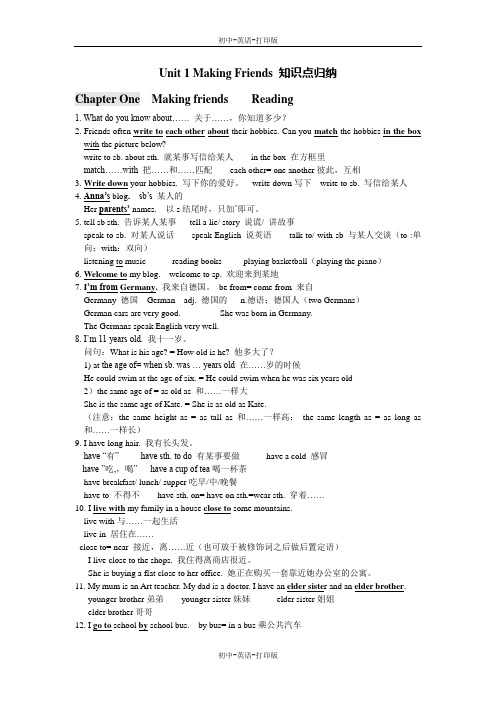
Unit 1 Making Friends 知识点归纳Chapter One Making friends Reading1. What do you know about…… 关于……,你知道多少?2. Friends often write to each other about their hobbies. Can you match the hobbies in the box with the picture below?write to sb. about sth. 就某事写信给某人in the box 在方框里match……with 把……和……匹配each other= one another彼此,互相3. Write down your hobbies. 写下你的爱好。
write down写下write to sb. 写信给某人4.Anna’s blog. sb’s 某人的Her parents’ names. 以s结尾时,只加’即可。
5. tell sb sth. 告诉某人某事tell a lie/ story 说谎/ 讲故事speak to sb. 对某人说话speak English 说英语talk to/ with sb 与某人交谈(to :单向;with:双向)listening to music reading books playing basketball(playing the piano)6. Welcome to my blog. welcome to sp. 欢迎来到某地7. I’m from Germany. 我来自德国。
be from= come from 来自Germany 德国German adj. 德国的n.德语;德国人(two Germans)German cars are very good. She was born in Germany.The Germans speak English very well.8. I’m 11 years old. 我十一岁。
新版上海牛津版七年级(上册)语法
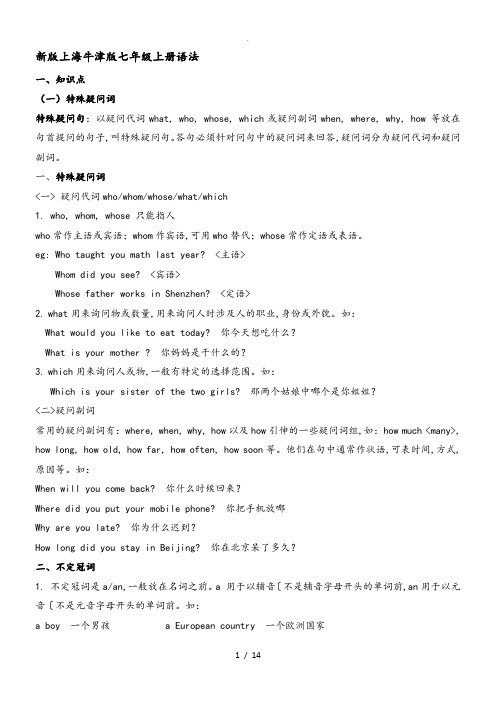
新版上海牛津版七年级上册语法一、知识点(一)特殊疑问词特殊疑问句:以疑问代词what, who, whose, which或疑问副词when, where, why, how 等放在句首提问的句子,叫特殊疑问句。
答句必须针对问句中的疑问词来回答,疑问词分为疑问代词和疑问副词。
一、特殊疑问词<一> 疑问代词who/whom/whose/what/which1. who, whom, whose 只能指人who常作主语或宾语;whom作宾语,可用who替代;whose常作定语或表语。
eg: Who taught you math last year? <主语>Whom did you see? <宾语>Whose father works in Shenzhen? <定语>2.what用来询问物或数量,用来询问人时涉及人的职业,身份或外貌。
如:What would you like to eat today? 你今天想吃什么?What is your mother ? 你妈妈是干什么的?3.which用来询问人或物,一般有特定的选择范围。
如:Which is your sister of the two girls? 那两个姑娘中哪个是你姐姐?<二>疑问副词常用的疑问副词有:where, when, why, how以及how引伸的一些疑问词组,如:how much <many>, how long, how old, how far, how often, how soon等。
他们在句中通常作状语,可表时间,方式,原因等。
如:When will you come back? 你什么时候回来?Where did you put your mobile phone? 你把手机放哪Why are you late? 你为什么迟到?How long did you stay in Beijing? 你在北京呆了多久?二、不定冠词1. 不定冠词是a/an,一般放在名词之前。
沪教牛津版七上U1-4知识点语法

沪教牛津版七上U1-4知识点语法一、形容词形容词用来描述名词的性质、状态、特征等。
它可以位于名词的前面或后面,用来修饰名词。
例句:1. This is a beautiful flower.(这是一朵美丽的花。
)2. She is a tall girl.(她是一个高个子的女孩。
)形容词的比较级和最高级:形容词的比较级和最高级用来表示两者或多者之间的比较。
形成比较级和最高级的方法:1. 一般情况下在形容词后直接加-er/-est,如bigger/biggest。
2. 以-e结尾的形容词,在后面加-r/-st,如nicer/nicest。
3. 以辅音字母+y结尾的形容词,先变y为i,再加-er/-est,如busier/busiest。
4. 重读闭音节单音节形容词和部分双音节形容词,在词尾加-er/-est,如hotter/hottest。
5. 部分双音节和多音节形容词前加more/most,如beautiful/more beautiful/most beautiful。
例句:1. This book is more interesting than that one.(这本书比那本书更有趣。
)2. They are the tallest buildings in the city.(它们是这个城市最高的建筑物。
)二、名词名词是用来表示人、事物、动物、地点、抽象概念等的词。
例如:1. I have a cat.(我有一只猫。
)2. Tom is a student.(汤姆是一个学生。
)名词的单数和复数形式:大部分名词加-s/-es构成复数形式,但也有一些不规则变化,如man/men,woman/women等。
例句:1. There are many apples in the basket.(篮子里有很多苹果。
)2. I have three dogs and two cats.(我有三只狗和两只猫。
牛津上海版七年级英语上册Unit1重点知识复习
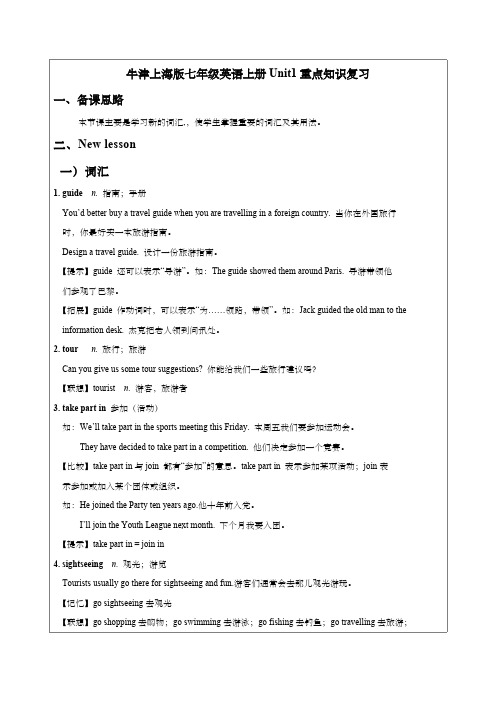
牛津上海版七年级英语上册Unit1重点知识复习一、备课思路本节课主要是学习新的词汇,,使学生掌握重要的词汇及其用法。
二、New lesson一)词汇1. guide n. 指南;手册You’d better buy a travel guide when you are travelling in a foreign country. 当你在外国旅行时,你最好买一本旅游指南。
Design a travel guide. 设计一份旅游指南。
【提示】guide 还可以表示“导游”。
如:The guide showed them around Paris. 导游带领他们参观了巴黎。
【拓展】guide 作动词时,可以表示“为……领路,带领”。
如:Jack guided the old man to the information desk. 杰克把老人领到问讯处。
2. tour n.旅行;旅游Can you give us some tour suggestions? 你能给我们一些旅行建议吗?【联想】tourist n.游客,旅游者3. take part in 参加(活动)如:We’ll take part in the sports meeting this Friday. 本周五我们要参加运动会。
They have decided to take part in a competition. 他们决定参加一个竞赛。
【比较】take part in与join 都有“参加”的意思。
take part in 表示参加某项活动;join表示参加或加入某个团体或组织。
如:He joined the Party ten years ago.他十年前入党。
I’ll join the Youth League next month. 下个月我要入团。
【提示】take part in = join in4. sightseeing n.观光;游览Tourists usually go there for sightseeing and fun.游客们通常会去那儿观光游玩。
2024秋沪教牛津新七年级上知识点清单(背诵版)
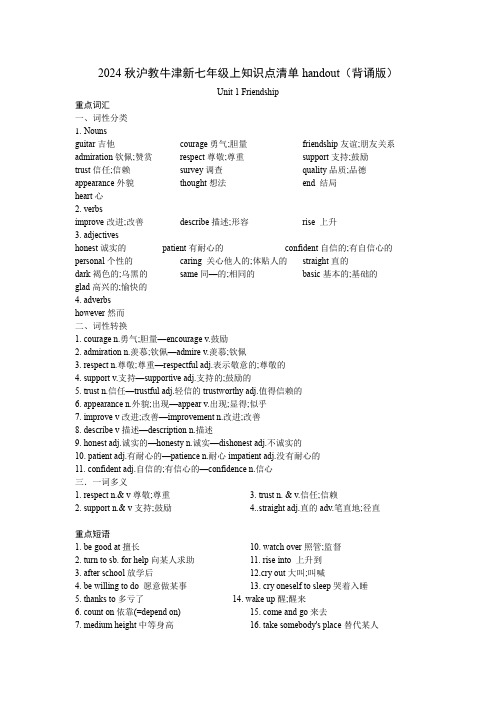
2024秋沪教牛津新七年级上知识点清单handout(背诵版)Unit 1 Friendship重点词汇一、词性分类1.Nounsguitar吉他courage勇气;胆量friendship友谊;朋友关系admiration钦佩;赞赏respect尊敬;尊重support支持;鼓励trust信任;信赖survey调查quality品质;品德appearance外貌thought想法end 结局heart心2. verbsimprove改进;改善describe描述;形容rise 上升3. adjectiveshonest诚实的patient有耐心的confident自信的;有自信心的personal个性的caring 关心他人的;体贴人的straight直的dark褐色的;乌黑的same同—的;相同的basic基本的;基础的glad高兴的;愉快的4. adverbshowever然而二、词性转换1. courage n.勇气;胆量—encourage v.鼓励2. admiration n.羡慕;钦佩—admire v.羡慕;钦佩3. respect n.尊敬;尊重—respectful adj.表示敬意的;尊敬的4. support v.支持—supportive adj.支持的;鼓励的5. trust n.信任—trustful adj.轻信的trustworthy adj.值得信赖的6. appearance n.外貌;出现—appear v.出现;显得;似乎7. improve v改进;改善—improvement n.改进;改善8. describe v描述—description n.描述9. honest adj.诚实的—honesty n.诚实—dishonest adj.不诚实的10. patient adj.有耐心的—patience n.耐心impatient adj.没有耐心的11. confident adj.自信的;有信心的—confidence n.信心三.一词多义1. respect n.& v尊敬;尊重 3. trust n. & v.信任;信赖2. support n.& v支持;鼓励 4..straight adj.直的adv.笔直地;径直重点短语1. be good at擅长10. watch over照管;监督2. turn to sb. for help向某人求助11. rise into 上升到3. after school放学后12.cry out大叫;叫喊4. be willing to do 愿意做某事13. cry oneself to sleep哭着入睡5. thanks to多亏了14. wake up醒;醒来6. count on依靠(=depend on)15. come and go来去7. medium height中等身高16. take somebody's place替代某人8. modern dance现代舞17. come along 出现9. take care of照顾(= look after / care for)核心句式1. What do you like doing?你喜欢做什么?2.Li Hua is helpful and patient.李华乐于助人且有耐心。
沪教牛津版七上-U1-4知识点、语法解析
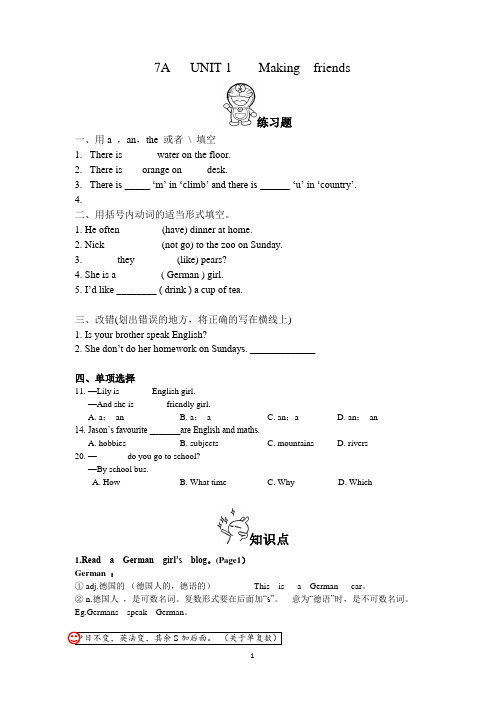
7A UNIT 1 Making friends练习题一、用a ,an,the 或者\ 填空1.There is ______ water on the floor.2.There is ___ orange on ____ desk.3.There is _____ ‘m’ in ‘climb’ and there is ______ ‘u’ in ‘country’.4.二、用括号内动词的适当形式填空。
1. He often ________(have) dinner at home.2. Nick ____ ___(not go) to the zoo on Sunday.3. ______ they ________(like) pears?4. She is a ________ ( German ) girl.5. I’d like ________ ( drink ) a cup of tea.三、改错(划出错误的地方,将正确的写在横线上)1. Is your brother speak English? __________________2. She don’t do her homework on Sundays. _____________四、单项选择11. —Lily is _______English girl.—And she is _______friendly girl.A. a;anB. a;aC. an;aD. an;an14. Jason’s favourite _______are English and maths.A. hobbiesB. subjectsC. mountainsD. rivers20. —_______do you go to school?—By school bus.A. HowB. What timeC. WhyD. Which知识点1.Read a German girl’s blog。
2024年沪教牛津版七年级英语上册 Unit1重点短语和知识
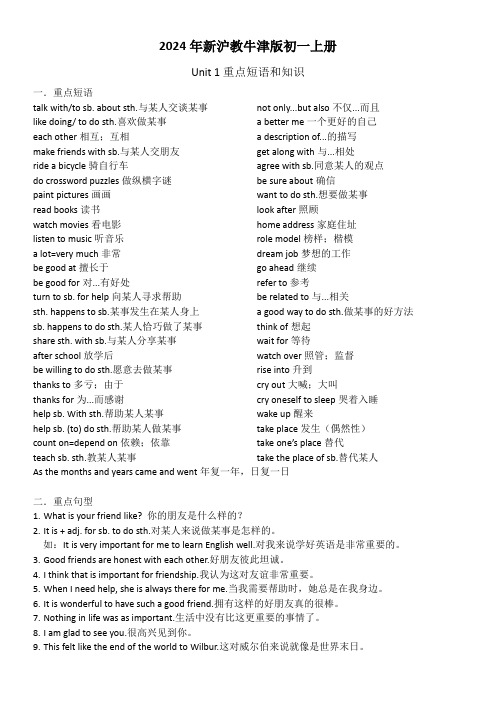
2024年新沪教牛津版初一上册Unit 1重点短语和知识一.重点短语talk with/to sb. about sth.与某人交谈某事like doing/ to do sth.喜欢做某事each other相互;互相make friends with sb.与某人交朋友ride a bicycle骑自行车do crossword puzzles做纵横字谜paint pictures画画read books读书watch movies看电影listen to music听音乐a lot=very much非常be good at擅长于be good for对...有好处turn to sb. for help向某人寻求帮助sth. happens to sb.某事发生在某人身上sb. happens to do sth.某人恰巧做了某事share sth. with sb.与某人分享某事after school放学后be willing to do sth.愿意去做某事thanks to多亏;由于thanks for为...而感谢help sb. With sth.帮助某人某事help sb. (to) do sth.帮助某人做某事count on=depend on依赖;依靠teach sb. sth.教某人某事not only...but also不仅...而且a better me一个更好的自己a description of...的描写get along with与...相处agree with sb.同意某人的观点be sure about确信want to do sth.想要做某事look after照顾home address家庭住址role model榜样;楷模dream job梦想的工作go ahead继续refer to参考be related to与...相关a good way to do sth.做某事的好方法think of想起wait for等待watch over照管;监督rise into升到cry out大喊;大叫cry oneself to sleep哭着入睡wake up醒来take place发生(偶然性)take one’s place替代take the place of sb.替代某人As the months and years came and went年复一年,日复一日二.重点句型1.What is your friend like? 你的朋友是什么样的?2.It is + adj. for sb. to do sth.对某人来说做某事是怎样的。
- 1、下载文档前请自行甄别文档内容的完整性,平台不提供额外的编辑、内容补充、找答案等附加服务。
- 2、"仅部分预览"的文档,不可在线预览部分如存在完整性等问题,可反馈申请退款(可完整预览的文档不适用该条件!)。
- 3、如文档侵犯您的权益,请联系客服反馈,我们会尽快为您处理(人工客服工作时间:9:00-18:30)。
实用文案7A UNIT 1 Making friends练习题一、用a ,an,the 或者\ 填空1.There is ______ water on the floor.2.There is ___ orange on ____ desk.3.There is _____ ‘m’ in ‘climb’ and there is ______ ‘u’ in ‘country’.4.二、用括号内动词的适当形式填空。
1. He often ________(have) dinner at home.2. Nick ____ ___(not go) to the zoo on Sunday.3. ______ they ________(like) pears?4. She is a ________ ( German ) girl.5. I’d like ________ ( drink ) a cup of tea.三、改错(划出错误的地方,将正确的写在横线上)1. Is your brother speak English? __________________2. She don’t do her homework on Sundays. _____________四、单项选择11. —Lily is _______English girl.—And she is _______friendly girl.A. a;anB. a;aC. an;aD. an;an14. Jason’s favourite _______are English and maths.A. hobbiesB. subjectsC. mountainsD. rivers20. —_______do you go to school?—By school bus.A. HowB. What timeC. WhyD. Which知识点1.Read a German girl’s blog。
(Page1)German :① adj.德国的(德国人的,德语的)This is a German car。
② n.德国人,是可数名词。
复数形式要在后面加“s”。
意为“德语”时,是不可数名词。
Eg.Germans speak German。
中国China,中国人/中文Chinese 日本Japan,日本人/日语Japanese,法国France,法国人/法语French 英国England/Britain/U.K.英国人/英语English Frenchman、Englishman等的复数把a改为e.2.Every day,I go to school by school bus.(page3)go to school是一个固定搭配,不要在“ school”前加“the”。
因为它并不指具体的某所学校。
所在在前面不要加任何冠词。
Go to bed 睡觉;go to hospital去医院;at home 在家注意:play basketball/football(球类),不用加“the”。
Play the piano/violin(乐器),要加“the”。
3.I like many sports.(page3)many :许多。
修饰可数名词复数。
Many sports 许多人Much:许多。
修饰不可数名词much water/time 许多水/手机a lot of既可以修饰可数名词又可以修饰不可数名词。
4.I’d like to be your e-friend. 我想成为你的网友。
(page11)I’d like =I would like 想要用法:①would like +名词如:I’d like an apple.②would like +to do sth注意:①would like 没有人称和数的变化。
②would like 构成的一般疑问句中,表示“一些”和“某物”时,要用“some”和“something”,而不用“any”和“anything”。
Would you like some bread.——Yes,please./No,thanks.语法一、人称代词2.is和单数第三人称he /she /it(他/她/它)连用,二、句子模式两种句子模式:A:无行为动作句子,简称“Be动词句子模式”。
就是这个句子里面没有表示行为动作的部分,造句时就用Be动词的形式。
B:有行为动词句子,简称“行为动词句子模式”。
例如:(1)我在家。
I am at home.(2)我在家吃早饭。
I have breakfast at home.三、特殊疑问句以疑问代词what, who, whom, whose, which或疑问副词when, where, why, how等放在句首提问的句子,叫特殊疑问句。
答句必须针对问句中的疑问词来回答。
(一)各种疑问词的用法:(二)(三)回答:不能用yes / no,即问什么答什么,尤其是简略回答。
四、不定冠词的用法①表示“一”,用于可数名词的单数形式前。
The company needs a worker.②表示“一类”,指一类人或事物,用在可数名词单数前。
An elephant is bigger than a cat. (二)用法7A UNIT 2 Daily life练习题一、单项选择1. My home is near my school, so I am late.A. alwaysB. sometimesC. oftenD. seldom2. —What Sam after class?—He takes part in the school band practice.A. is; doB. does; doC. do ; doD. does;does3. Tom is good at playing.A. pianoB. a pianoC. pianosD. the piano二、句型转换1.She with her best friend often flies a kite in the park.(改为一般疑问句)___________________________________________________2.She always goes to the Swimming Club on Tuesday afternoon.(否定句)___________________________________________________三、动词填空1. He often________ ( go)to school on foot every day.2. I always________ (go) to the park on Sundays.知识点1.My school is close to my home, so I always go to school on foot.(page17)①be close to 离……近= near =beside= not far away from(上节课学过)②so在此处用作连词,表示结果“因此;所以”的意思。
不可以将because和so同在一个句子里。
(他们两个就像两只老虎,一山不能容二虎。
类似的还有although/ though 和but。
)语法一、一般现在时(一)含义:表示经常性或习惯性的动作,或表示现在的特征或状态。
1.表示事物或人物的特征、状态。
如:The sky is blue.天空是蓝色的。
2.表示经常性或习惯性的动作。
如:I get up at six every day.我每天六点起床。
(二)一般现在时的构成1. be动词:主语+be(am,is,are)+其它。
如:I am a boy.我是一个男孩。
2.行为动词:主语+行为动词(+其它)。
如:We study English.我们学习英语。
当主语为第三人称单数(he, she,it)时,谓语动词要用第三人称单数,即要在动词后加"-s" 或"-es"。
如:Mary likes Chinese.玛丽喜欢汉语。
(三)一般现在时的变化1. be动词的变化。
①否定句:主语+ be + not +其它。
如:He is not a worker.他不是工人。
②一般疑问句:Be +主语+其它。
如:-Are you a student? -Yes. I am. / No, I'm not.③特殊疑问句:疑问词+一般疑问句。
如:Where is my bike?2.行为动词的变化。
(do/does)①否定句:主语+ don't( doesn't ) +动词原形(+其它)。
如:I don't like bread.当主语为第三人称单数时,要用doesn't构成否定句。
如:She does not play the guitar.②一般疑问句:Do( Does ) +主语+动词原形+其它。
如:- Do you often play football? - Yes,I do. / No, I don't.当主语为第三人称单数时,要用does构成一般疑问句。
如:- Does she go to work by bike? - Yes, she does. / No, she doesn't.③特殊疑问句:疑问词+一般疑问句。
如:How does your father go to work?(四)动词碰到第三人称单数时,要进行相应的变化:动词+s的变化规则1. 一般情况下,直接加-s,如:work - works2. 以s. x. sh. ch. o结尾,加-es,如:guess-guesses, wash-washes, watch-watches, go-goes3. 以“辅音字母+y”结尾,变y为i, 再加-es,如:study-studies carry - carries4. have - has二、频度副词②频度副词位置be后He is always kind to others. 他总是对别人很好。
实动前I often get up early. 我经常起得早。
助主间I can never forget the day. 我每天步行去上学。
(助动词和主要的实义动词间)③对频度副词提问时,用how often.--How often do you go to see your grandparents? --Once a week.7A Unit3 The Earth练习题一.单项选择(每小题1分,共10分)1. There ____ a book and two pens on the desk.A. isB. areC. beD. /2. It’s important _______ us to study hard.A. toB. forC. onD. with知识点1.It's important for us to protect the Earth for our future.(page31)为了我们的未来,保护地球很重要。
